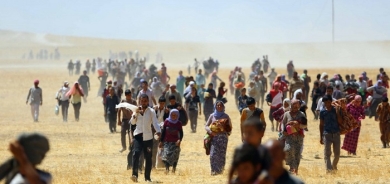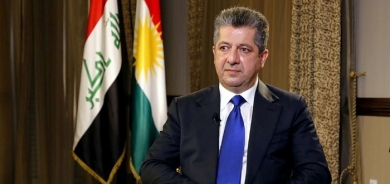Dr. Howard M. Federspiel: Iran seems to be taking advantage of situations in which people involved in nasty political problems
May 12, 2016
Exclusive Interviews

Iran seems to be taking advantage of situations in which people involved in nasty political problems
Dr. Howard M. Federspiel is a professor emeritus of Ohio State University in the United States. He was for many years associated with the Institute of Islamic Studies at McGill University in Montreal, Canada. His teaching specialty was Islamic and Muslim political philosophy. During his career he published eleven books and over forty professional articles on Islam. For analyzing the current chaotic condition, sectarian conflict, and foreign meddling in the domestic affairs of the Middle Eastern countries, as well as the Kurdish aspiration to exercise self-determination right, we have conducted an interview with Dr. Howard, and he answered our questions as following:
Gulan: If the important nations cannot agree on a common strategy to deal with the current crisis in the Middle East, what are the most likely scenarios?
Howard M. Federspiel: That is precisely the situation in which we all find ourselves today. There is total lack of agreement among the U.S., Russia and the various states of the Middle East about just what the threats are and how to deal with them. Moreover, it is unlikely that agreement and consensus will come about any time soon. After all, the Middle East is a very diverse place with contending claims and political desires that cannot all be fulfilled even in the best of times and with the best of intentions. Realistically we can only hope for minimal goals: the elimination of ISIS as a virulent political actor which threatens all others and is unstable to boot; and modest restructuring of badly fractured political entities such as Syria, Iraq, Libya and Yemen to create stability that one can build on later. To do these two things will take gigantic efforts and are apt to be done only in part. More is not likely.
Gulan: To what extent was Iran's interference in Syria responsible for the rise of ISIS?
Howard M. Federspiel: Somewhat, but the radical threat emanating from political thought among ideologues basing their suppositions on Islam was a threat long before ISIS came into existence. After all al-Qa'ida and the Taliban predated ISIS, al-Shabaab exists now, and other representations are likely to appear later. Iranian influence in Lebanon and Syria may have had its role when ISIS arose, but the poor response by the Iraqi government was the immediate cause of ISIS's success in western Iraq and eastern Syria.
Gulan: Iran acts on one hand as a sovereign nation and the other as the protector of Shi'ite groups wherever they are located. How can one deal with such duality?
Howard M. Federspiel: With difficulty. There are two factors here. First, Iran has a long history as an autonomous political identity stretching back to the ancient Medes and throughout its history its political leaders have attempted to extend its influence in neighboring areas. Its present attempts are simply an historical extension of that desire to influence others, as other prominent nations do throughout the world. Second, Iran's clergy historically has made Shiite Islam an important national characteristic, while no other Shi'ite group in other countries did that to any extent. Iran can play the religious card because it describes Shi'ite Islam better than any other group and, hence, is its leader. The duality is not so important when dealing with Iran so long as other nations recognize this duality. For the immediate future Iran is apt to be regarded as hostile, so limits will be placed on it by its neighbors, which will keep tensions high.
Gulan: How can growing influence of Iran in Yemen, Palestine, Syria, Yemen and other places be countered?
Howard M. Federspiel: Iran seems to be taking advantage of situations in which people involved in nasty political problems can identify with Iran as a helper or a giver of aid. This is the case of Hamas in Palestine and the Hezbollah in Lebanon, for example. The underlying problems exist whether Iran becomes involved or not. It is only that with Iran involved the problem becomes even harder to handle Present strategies seem to concentrate on isolating and controlling dissatisfied populations, which has not worked terribly well. Softening Iranian control would be preferable, but that takes cooperation with very suspicious Iranian power elite and is not likely to happen soon. Encouraging countries with these problems to seek answers within their own nations appears to be the only method that has hope of success and is dim at best.
Gulan: In a post-ISIS world (in which ISIS is no longer of any consequence) is Iran likely to replace ISIS as a threat to other states in the region?
Howard M. Federspiel: It depends entirely on the political situation at the time that ISIS expires. If Iran and its neighbors arrive at some political accommodations, then Iran will not be a threat, but if present political stances prevails it will be. I am not optimistic about improved relations, but hope for some thaw that will keep Iran from being the boogeyman of the Middle East.
Gulan: Will the international treaty with Iran on nuclear energy allow Iran to extend its influence in the Middle East?
Howard M. Federspiel: Probably not. Given tensions that already exist and strong suspicions in the world in general about Iranian reliability, nations of the region are not likely to be favorably inclined towards Iran, at least in the short run. We can expect more of the same suspicion and distrust on all sides that existed earlier.
Gulan: Will Russians actions to guide its client states (Syria, Iraq and Iran) for its own goals lead to a reaction by Sunni states which will put pressure on the U.S. to push back?
Howard M. Federspiel: Perhaps, but outside powers, such as Russia or the United States are slow to react when their regional allies see a threat which the outside powers do not see as an immediate threat to themselves. It took Russia a long time to react to the Assad government's dire position and U.S. reaction in both Iraq and Afghanistan has been often weak and always sporadic, depending on the mood in Washington. The question could be posed as "Will the United States take seriously Russian actions in the Middle East that seem to threaten the regional allies of the U.S?" I would answer that question as hinging on the success of the Russians in transforming the battlefield of Syria over to its own interpretation and the fears it raises in the minds of key American diplomats, military commanders and administrators in the region. They are the people who set the agenda for Washington; unfortunately not the leaders of nations in the region.
Gulan: Are allies of the Iraqi Kurds, who rely on them as the front line against terrorism in the Middle East, likely to give due support to the Iraqi Kurds' political goals?
Howard M. Federspiel: Much depends on the restructuring of the Iraqi state where the dominant Shiites are attempting to structure a government that other factions will accept. U.S. policy aims at reinstitution of a united Shia-Sunni-Kurd state with some autonomy for each of the three groups. Pressure on the Peshmarga to act as an army to protect the northern flank of Iraq may well lead to even greater recognition of autonomy than already exists, because the Iraqi state will have no alternative if they want Peshmarga to undertake such action. How far this will politically benefit Iraqi Kurdistan will depend on the degree of support that Baghdad and Washington want to grant and how much the Iraqi Kurds are able to demand.















